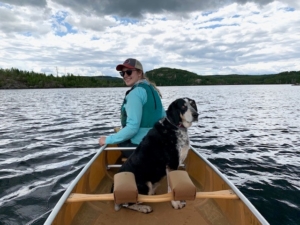A Theoretical Framework for Welcoming Campers

Kristin and her trusty paddling partner Maggie
When I tell people what I do for a living, I often experience a disconnect between what they imagine I do and how I actually live out my vocation. Many people imagine working at a summer camp as something like a stationary cruise director for kids. They assume that the job consists of planning activities to keep kids busy and assuring that they are happy and safe. And these things are certainly true to an extent. I do help to plan canoe trips and other activities in the Boundary Waters Canoe Area Wilderness, and I spend a whole lot of time thinking about how to keep campers safe and having a great time.
But I think we do a significant disservice to our youth when we imagine that summer camp is simply a place where kids want to go and take a vacation with their friends. Today more than ever, it is critical that we understand the youth in our care as integral and full members of our communities who come to us with not only a desire to try new things and have fun away from home, but also with a need to explore who they are in relation to what is happening in their world (not to mention learning all kinds of new camping skills and teamwork strategies on top of that internal work)!
I would argue that it has always been the case that the lives of youth are saturated with the same issues that adults are tasked with solving: the ramifications of living in a country whose legacy and present reality is steeped in the power of white supremacy, the disenfranchisement that occurs with the unequal distribution of wealth, and the perpetual struggle to find wholeness in a culture that typically fails to see every human as a child of God in favor of quantifying their achievements and access to power. In my experience, kids don’t show up at camp as apolitical beings who leave their everyday lives behind when they dip their toes in Seagull Lake. Rather, the struggles of growing up in America in 2021 come with them on their canoe trips, and we as camp professionals have the incredible opportunity to help campers express their full selves in the midst of it all.
This is why it’s essential that we as camp staff spend time cultivating an intentional praxis that best enables us to welcome campers to our sites as they are. For me personally, this requires ongoing work (because it is never finished) to weave theories of anti-racism, anti-colonialism, liberation theology, ecological justice, feminism, and trauma-informed pastoral care into my daily work. I am lucky to have fantastic colleagues with whom I can collaborate on this communal process of learning and forming a space that embodies “just love” in the best way we know how. And I feel immense gratitude to be working within the context of a larger church body which is also calling for justice and reconciliation in all moments.
This summer, we will be welcoming campers and summer staff back who will surely be trying to integrate themselves into a world that has forced them to bear witness to incredible hardships on the global and local scale. And in the midst of this reality, we will have the immense privilege of welcoming them into our sites as members the body of Christ. If one camper suffers, we all suffer. And if one camper is honored, we all rejoice with them (a paraphrase of 1 Corinthians: 26). And this is one of the guiding principles through which we will tailor our work as we prepare for the summer of 2021, along with the logistical and safety concerns that go along with creating safe sites with meaningful programming. We can’t wait to join with you as we do this work in the months to come!
Written by Kristin Middlesworth, Wilderness Canoe Base Site Manager